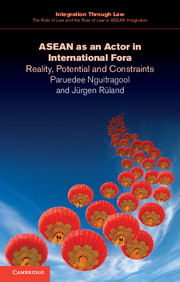Book contents
- Frontmatter
- Contents
- List of tables
- General editor's preface
- Acknowledgements
- List of abbreviations
- 1 Introduction
- 2 Analytical framework: a cognitive approach of externalization
- 3 ASEAN's cognitive prior and negotiating capacities
- 4 ASEAN as a negotiator in global fora: stages of negotiation
- 5 ASEAN as an actor in global fora: negotiation strategies
- 6 Case studies
- 7 Conclusions and future options
- Executive summary
- References
- Index
6 - Case studies
Published online by Cambridge University Press: 05 May 2015
- Frontmatter
- Contents
- List of tables
- General editor's preface
- Acknowledgements
- List of abbreviations
- 1 Introduction
- 2 Analytical framework: a cognitive approach of externalization
- 3 ASEAN's cognitive prior and negotiating capacities
- 4 ASEAN as a negotiator in global fora: stages of negotiation
- 5 ASEAN as an actor in global fora: negotiation strategies
- 6 Case studies
- 7 Conclusions and future options
- Executive summary
- References
- Index
Summary
The previous chapters examined ASEAN's cohesion in international forums, mainly the United Nations (UN) and the World Trade Organization (WTO). We came to the conclusion that in all three major phases of negotiation (Chapter 4) and with regard to five major negotiation strategies, ASEAN's cohesiveness (Chapter 5) is quite in line with what we predicted at the end of Chapter 3 after studying the world views of foreign policy elites, how these cognitive dispositions shaped the grouping's repository of cooperation norms and how the latter reflected on the grouping's organizational structure. ASEAN's collective behavior in international forums is ambiguous and does not reveal stable long-term trends towards greater cohesiveness. It more resembles a caucus than a quasi-bloc, especially in tangible areas of negotiation such as norms and rules of the international order, trade and climate change, and in the application of crucial negotiation strategies such as the quest for leadership positions, coalition-building and, to a lesser extent, forum shopping.
Yet we are aware that these findings rest thus far on a rather broad and eclectic analysis. The subsequent two in-depth case studies have the function of examining the preliminary evidence derived from Chapter 5. We chose, as outlined in the methodology, two cases that are characterized by considerable variation in outcome. In the first case, the material distribution of values is up for negotiation, in the second case, a normative or ideational issue.
Case 1 ASEAN and GATT/WTO negotiations on agricultural and tropical products
Background: agriculture in the global trade regime
Although it is difficult to determine exactly when agriculture became an agenda for trade negotiation, trade in agricultural products was already part of the discussions at the time of the establishment of the General Agreement on Tariffs and Trade (GATT) in 1947. Despite an increased recognition of the problems related to agricultural products from developing countries in the 1950s, little progress had been made in reforming agricultural trade.
- Type
- Chapter
- Information
- ASEAN as an Actor in International ForaReality, Potential and Constraints, pp. 200 - 248Publisher: Cambridge University PressPrint publication year: 2015

